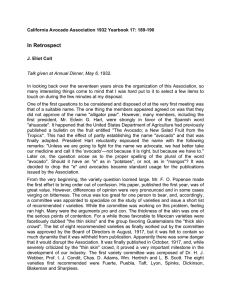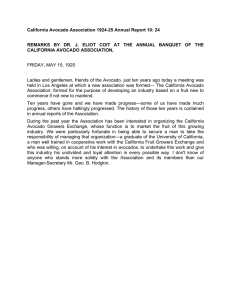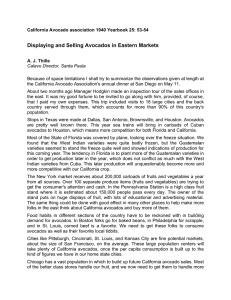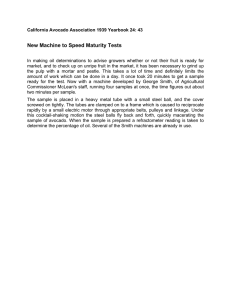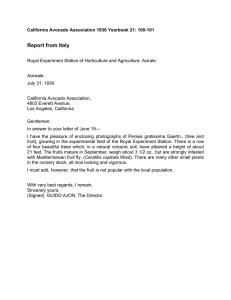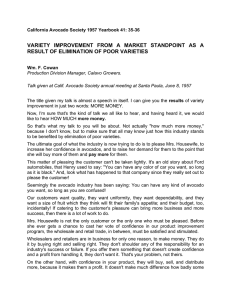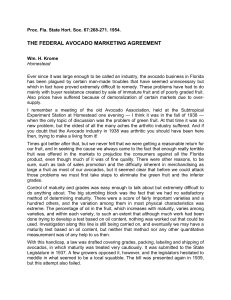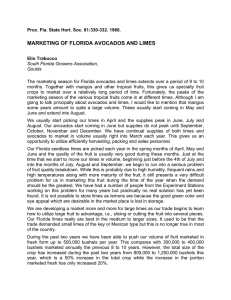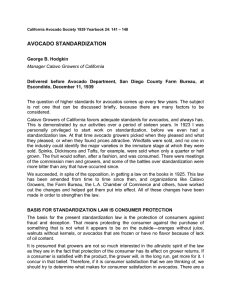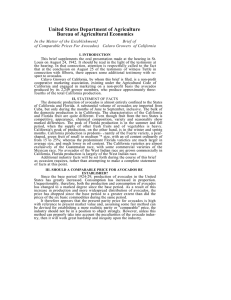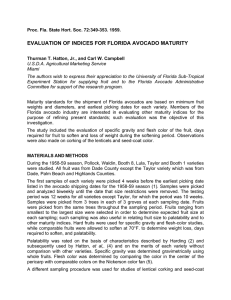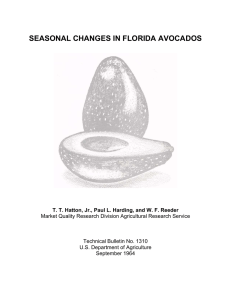The Importance of Maturity in Avocados
advertisement
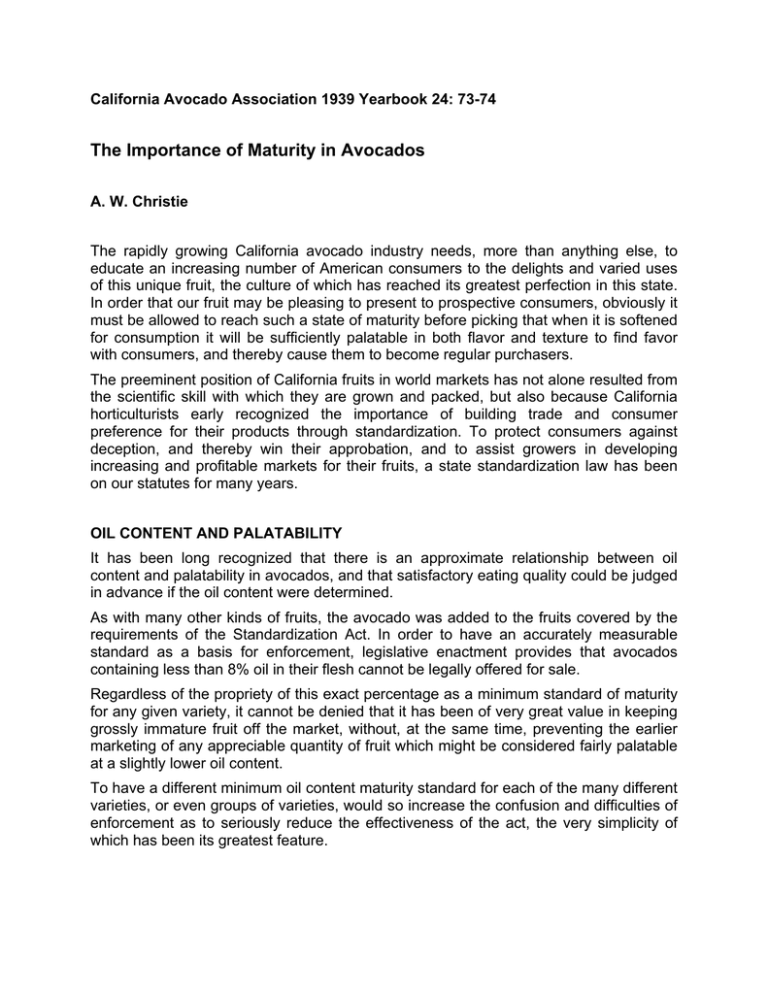
California Avocado Association 1939 Yearbook 24: 73-74 The Importance of Maturity in Avocados A. W. Christie The rapidly growing California avocado industry needs, more than anything else, to educate an increasing number of American consumers to the delights and varied uses of this unique fruit, the culture of which has reached its greatest perfection in this state. In order that our fruit may be pleasing to present to prospective consumers, obviously it must be allowed to reach such a state of maturity before picking that when it is softened for consumption it will be sufficiently palatable in both flavor and texture to find favor with consumers, and thereby cause them to become regular purchasers. The preeminent position of California fruits in world markets has not alone resulted from the scientific skill with which they are grown and packed, but also because California horticulturists early recognized the importance of building trade and consumer preference for their products through standardization. To protect consumers against deception, and thereby win their approbation, and to assist growers in developing increasing and profitable markets for their fruits, a state standardization law has been on our statutes for many years. OIL CONTENT AND PALATABILITY It has been long recognized that there is an approximate relationship between oil content and palatability in avocados, and that satisfactory eating quality could be judged in advance if the oil content were determined. As with many other kinds of fruits, the avocado was added to the fruits covered by the requirements of the Standardization Act. In order to have an accurately measurable standard as a basis for enforcement, legislative enactment provides that avocados containing less than 8% oil in their flesh cannot be legally offered for sale. Regardless of the propriety of this exact percentage as a minimum standard of maturity for any given variety, it cannot be denied that it has been of very great value in keeping grossly immature fruit off the market, without, at the same time, preventing the earlier marketing of any appreciable quantity of fruit which might be considered fairly palatable at a slightly lower oil content. To have a different minimum oil content maturity standard for each of the many different varieties, or even groups of varieties, would so increase the confusion and difficulties of enforcement as to seriously reduce the effectiveness of the act, the very simplicity of which has been its greatest feature. CHANGE IN OIL CONTENT STANDARD OPPOSED Any lowering of the present standard would simply increase the quantity of immature, unsatisfactory fruit on the market, not to mention the easier importation of low oil content avocados from other producing districts, both domestic and foreign. To increase the present standard would tend to decrease the quantity of passable, though not high quality, fruit of a given variety which could otherwise be marketed during the early part of the season. However, any such increase would likewise work considerable hardship on varieties which reach satisfactory maturity at a lower oil content than others, even to the extent of having such varieties drop heavily before pickable under the standard. Moreover, increasing the minimum standard would automatically reduce the length of the effective shipping season, and thereby cause a higher peak of shipments and less profitable returns. Shortening the shipping season at the first end would lead to efforts to lengthen it at the other end, causing consumer reaction from unsightly over-mature fruit, not to mention grower loss through dropping and heavier culling when picking is deferred too long. Poor quality, through over-maturity, becomes particularly serious when fruit is shipped great distances and held a long time before consumption. In short, all that the 8% standard seeks to do is to prevent the foisting of palpably immature fruit on the unsuspecting consumer. The avocado Standardization Act does not seek to set up quality standards. Such standards, above the minimum requirement, can and should be established and maintained—by packing and marketing agencies for the preferential development of their brands in the markets. The present standard has been at once a great help and a great safeguard in the development of markets for California avocados. Like any-standard, it may be susceptible of improvement or refinement, but no change should be enacted unless based on sound premises of experience, unless its effects have been carefully predetermined, and unless it meets with the hearty support of the great majority of producers. CONCLUSION In conclusion, we cannot too heartily endorse the splendid cooperation of the standardization officials of the State Department of Agriculture and of the County Agricultural Commissioners in the enforcement of the avocado standard. Unfortunately, however, there have been a few instances where violating packers have gone unconvicted, or have received such nominal fines that they were not deterred from continuing the shipment of immature fruit at a profit to themselves but to the detriment of consumers and growers alike. While modification of the present standard may be found desirable in the future, what is more needed now, as well as with any future standards, is complete and strict enforcement, to the end that both consumer and producer will be protected from the damage which invariably results when immature or over-mature avocados, unsightly or unpalatable, are placed on the market. As growers, we can best enhance the future of our industry by maintaining the necessary minimum governmental standards and acts for their enforcement, and by wholeheartedly supporting all officials charged with such enforcement.
